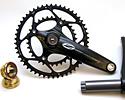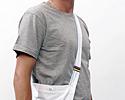
Recently on Cyclingnews.com |
New Arrivals – January 31, 2008Edited by James Huang Got Tech? Send press releases, news, and tech questions to the Cyclingnews tech-heads. Welcome to New Arrivals, a section showcasing the latest equipment that's landed on the Cyclingnews tech desk. Look out for reviews over the next few months when we've clocked up some saddle time with this stuff.
Zipp shatters even its own benchmarks with the introduction of the new VumaQuad crankset. Actual weight on the complete assembly (ceramic bearing bottom bracket cups, 34/50T chainrings, hardware, and all) is just 560g, which betters the Zipp 300 crankset and 175 bottom bracket combo by almost 90g, Shimano Dura-Ace by almost 200g, and the newest Campagnolo Record Ultra-Torque by about 230g. Yikes. Even so, Zipp claims a 33% stiffness advantage over its next-lightest competitor (and we're talking absolute values here, folks, not stiffness-to-weight ratio) courtesy of its carefully engineered carbon fiber design, 30mm-diameter aluminum spindle, and four-arm proprietary chainrings complete with hidden fourth-arm. Stance width is a slim 146mm. All of this technology obviously comes at a hefty price, though, but based on our prior experience with the VumaQuad's predecessor we expect some high performance to go with it. Price: US$1200 (complete crankset and bottom bracket with ceramic bearing upgrade) |
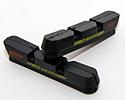
|
Carbon rims are renowned for their performance benefits but also for their sometimes less-than-optimal braking performance. In response, Zipp claims to have developed the first thermally conductive, low-temperature brake pads specifically for use in bicycle applications. Zipp even goes so far as to claim its proprietary compound is 2-3 times more thermally conductive than copper.
Why should you care? The more heat that can be dissipated through the pad and brake caliper, the less that is available to transfer to the rim, thus preventing tubular glue softening or clincher tire blowout. According to Zipp, the Carbon/Carbon pads also contain no abrasives so they're safer for carbon braking surfaces and easier on aluminum ones.
Price: US$25 per wheel (available for both Shimano and Campagnolo-compatible pad holders)
Williams Cycling Wheel System 38 wheelset
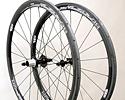
|
Direct-to-consumer wheel retailer Williams Cycling surprised us with its value-packed Wheel System 30 set last year and has since expanded into the higher-end segment with two new carbon-rimmed tubular models. For just US$1199 a set, the Wheel System 38 uses 38mm-deep Zipp Pavé carbon tubular rims, triple-butted spokes drawn from Sandvik stainless steel, and ceramic bearing-equipped cartridge bearing hubs that are claimed to weigh just 345g for the pair.
The rims share the same basic shape and silica ceramic braking surface as Zipp's own 303 wheels but use a smooth, non-dimpled surface and pack a few extra grams courtesy of a beefier carbon lay-up schedule. Externally-located brass nipples are specified for their improved durability and easier servicing but even with their slight weight penalty over alloy, actual weight of our test pair is still just 1222g (496g/726g front/rear, plus 92g for the included titanium skewers).
If the build quality or performance of the Wheel System 38 is anything close to what we've now come to expect from Williams Cycling, we have high hopes for these indeed.
Price: US$1199 (including skewers and valve extenders)
Continental Grand Prix Attack and Force clinchers
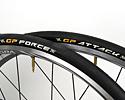
|
Continental debuted its much-touted Black Chili rubber compound in early 2007 and has now integrated the supposedly lighter, faster, and grippier stuff into its revised Grand Prix Attack and Force road clinchers.
Just as before, the Attack and Force are intended to be a matched front and rear combo. The front-specific Attack uses a slightly narrower-than-normal 22mm-wide 330tpi casing for lighter weight while the rear-specific Attack grows in width from last year to 24mm for extra drive traction and durability. Both tires also swap their previous nylon breaker belts for ones made of Vectran fibers.
Actual weight on our test set is 382g for the pair (187g front/195g rear). Our plan is to install these on our recently-tested Bontrager Aeolus 5.0 clincher wheelset to see if we can't make an already-impressive wheelset even faster!
Price: US$51.99 front or rear; US$99.99/pair
Continental GP4000 tubulars
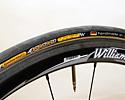
|
We don't often look forward to gluing up tubulars but Continental's new Grand Prix 4000 promises to at least not make us want to pluck our eyeballs out with a spoon. A unique seamless casing design omits the occasionally problematic ridge that typically runs beneath the length of the base tape, thus making for easier installation and centering as well as a potentially rounder circumference.
Continental also claims the seamless construction cuts down on rolling resistance which might also be aided by the addition of the company's new Black Chili compound. A Vectran breaker belt under the tread will make us feel a little better when we willfully head out on training rides in regions without cell phone coverage and without packing a spare. Nothing like playing with fire, eh?
Actual weight of our test pair is 498g (249g each, ±1g).
Price: US$89.99 each
Cateye V3 computer
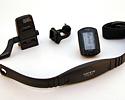
|
Cateye takes its wireless computer line to the next level with its latest V Series models. The integrated digital 2.4GHz transmission is said to be the fastest in the industry for the closest thing to real-time data available but the real story may lie with the unit's design.
The range-topping speed-, cadence-, and heart rate-equipped V3 features a sleek chain stay-mounted transmitter that houses both the cadence and speed sensors in a small, good looking, and (listen up, mechanics) easy to install package. Just a single pair of zip ties secures it to the frame and the position of the cadence sensor is also independently adjustable without tools to attain the proper spacing. The rear-mount configuration also means that the V3 will work with most indoor trainers, too.
The simpler V2c skips the heart rate features but shares a similar computer head and the same integrated speed and cadence sensor as the V3. A large four-line display offers up a comprehensive snapshot of information (the V3 also splits one of those lines in two) and the five top-mounted buttons are easily accessible on the road. Both are mounted with Cateye's excellent FlexTight tool-free bracket. Total weight for our V3 tester is 138g including all mounts, hardware, and HRM strap.
Price: US$180 (Cateye V3); US$140 (Cateye V2c)
Cateye Single Shot headlight
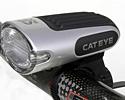
|
Most of us are still mired in the short days and long nights of winter and proper lights can mean the difference between getting to your destination safely and doing a Superman over an unseen pothole. Cateye hopes you opt for the former option with the assistance of its new Single Shot LED lamp.
The 1W LED in Cateye's novel Reverse Offset Lens (ROL) configuration actually points inwards, not out like most conventional lamps. Light output is focuses on to a precision-shaped reflector and then directed out through the outer lens for what Cateye says is a more usefully shaped and efficient beam.
The tidy Single Shot features high, low, and flashing settings along with an integrated NiMH rechargeable battery pack. A charging port is built right into the bottom of the body for easy accessibility and charge time is a reasonable four hours. The quoted two-hour run time (on high) isn't intended for long nights in the saddle, but its surprisingly bright output looks to be more than sufficient for typical commutes home. Total weight including the FlexTight bracket is 132g.
Price: US$99.99
Blackburn Camber CF cages
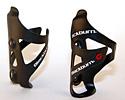
|
Blackburn tosses its hat into the carbon fiber bottle cage ring with its Camber CF. As expected, it's lightweight at just 30g but Blackburn also says it's suitably stiff and durable thanks to reinforcing ribs along its flanks. The flared mouth eases bottle insertion and removal and the large tab at the bottom promises to be blowout-free. As with all Blackburn products, the Camber CF is backed by the company's superb lifetime warranty and the sleek styling comes at no extra charge.
Price: US$39.99
Rocket Science Sports dimpled bottle
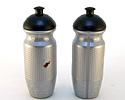
|
Can a water bottle make you faster? Absolutely, at least if you ask Rocket Science Sports. Its new water bottle is the latest victim of the dimpled surface craze with a golf ball-like surface on its polyethylene body that is said to reduce the speed-robbing pressure drag commonly associated with smooth finishes.
We're as skeptical as you are at this point but according to wind tunnel testing by John Cobb, Rocket Science Sports' dimpled bottle can save an unreal 53 seconds during a 40km TT (300W average rider output, unspecified cage). Sound too good to be true? Maybe, but at just US$9.99 for each 20oz capacity bottle, it might at least be worth a look. If worse comes to worse, at least you're still left with a decent bottle.
Price: US$9.99
Sharp streetwear for cyclists
The concept of 'streetwear for cyclists' is behind the new clothing brand, A'qto (pronounced 'a-cue-toe'). The company's founder and chief designer is Damian Hancock, a keen cyclist from the Australian city of Melbourne. Hancock 's produced a line of clothing for those who love road cycling, including finely-crafted crew and veen-neck tee-shirts, polo shirts and accessories, such as musettes, that all feature cycling motifs and iconic images that are designed to reflect the passion of cycling.
Some of the shirts feature embroidered images and all include a subtle rainbow stripe ribbon sown into the garment, as well as other subtle touches, such as the small, soft rubber A'qto logo and other motifs. The polo shirt, available in white and navy blue, features a 'BCFdM' emblem embroidered in white cotton. BCFdM stands for the La Bicicletta Corrende la Federazione di Milano, or The Bicycle Racing Federation of Milan.
The concept of casual wear linked to a specific outdoor pursuit or passion has been a specialty of several Australian companies, with surfwear brands like Quicksilver, Billabong, Rip Curl and even Mambo becoming global brands by successfully appropriating the surfer's lifestyle and image into their clothing. While these surfwear companies still make 'technical' clothing and other surfing products, the bulk of their sales come from casual wear.
The same concept is behind A'qto. Damian Hancock said of the name: "I wanted to pay homage to Italy, the birthplace of cycling and have a Euro feel to my brand. a'qto is derived from the Italian word a'cuto, meaning sharp, pointed, acute, keen, and intense. The spelling has been re-arranged so that when spoken (phonetically) in English it still sounds correct and looks interesting".
The comfortable, loose-fitting clothing is made from soft cotton jersey and is presented in understated colours, such as pale blue, grey and black. The cycling images are also understated, but on closer inspection reveal the passion of road cycling, and road bicycles. So far, the clothing is only available in selected cycling stores in Victoria, Australia, but it's also available online through its website that has an e-commerce shopping facility and A'qto is currently running a special where it's offering a free musette for every purchase of two tee-shirts. The shirts are priced at AUD$49.99 including GST.
For further information visit the A'qto website.
![]()
Photography
For a thumbnail gallery of these images, click here
Images by James Huang/Cyclingnews.com
- Zipp's new VumaQuad crankset is its lightest yet and possibly its stiffest, too.
- A massive 30mm aluminum spindle makes a standard external-type spindle look tiny by comparison.
- Chainring bolts thread directly into the small chainring.
- The Zipp Carbon/Carbon pads are claimed to be the first thermally conductive brake pads ever developed for bikes.
- Williams Cycling moves into the high-end with its Wheel System 38 and Wheel System 58 carbon tubulars.
- Rims are made by Zipp and other than their smooth surface and heavier lay-up, they're nearly identical to their pricier counterparts.
- External nipples make for easier truing.
- The aluminum freehub body conceals a full set of hybrid ceramic bearings.
- Continental updates its Attack and Force clinchers with its new Black Chili rubber compound and Vectran breaker layer.
- The new models are easily identified by their updated tread designs.
- The Continental GP4000 tubular uses a unique seamless casing construction.
- A Vectran breaker promises to resist most cuts and punctures.
- Cateye's new V3 computer boasts a faster wireless signal…
- …and an incredibly clean and tidy sensor that combines speed and cadence information in one convenient package.
- The new Cateye Single Shot looks to pack a lot of light in a little package.
- An easily accessed port allows for easy charging without having to remove the lamp head.
- Blackburn's new Camber CF bottle cage is light, holds bottles well, and is covered by the company's outstanding lifetime warranty.
- Can this bottle make you faster? Rocket Science Sports says so.
Images by Cyclingnews.com
- The 'chase graphic' vee-neck casual shirt in black. Each A'qto item also has a small ribbon of the rainbow stripe motif sown into the garment.
- The 'chase graphic' in this v-neck casual shirt in pale blue is actually embroidered into the fabric. It's one of the new range of casual clothing items from Australian company, A'qto.
- This crew neck t-shirt from A'qto is called 'away' and features the outline of a sleek Italian racing bike printed in a wrap-around from front to back.
- Paul Verkuylen from Cyclingnews wears the 'away' style crew-neck t-shirt in grey, along with the specially designed musette that's also made by A'qto. For a limited time, the company is offering a free musette with every two t-shirts ordered via its online facility.

